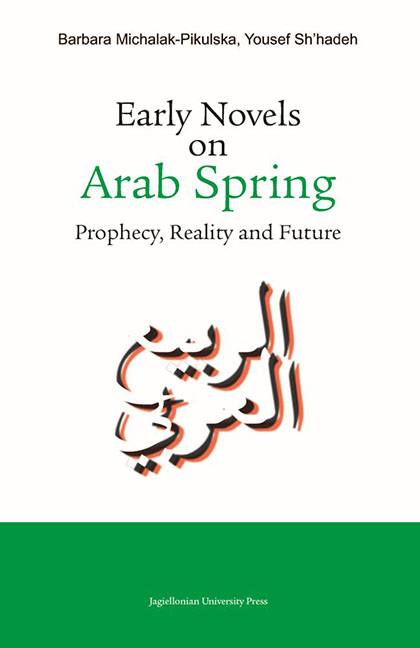Book contents
- Frontmatter
- Contents
- Introduction
- Part I Awakening of the Awareness of Subjugation – The Prophecy of the Spring of Nations in Arab Novels
- Part II At the Heart of the Arab Spring Events
- Part III The Future: The Spring Continues
- 17 Mu‘Taṣim Aš - Šā‘Ir : Uhzūǧat ar-raḥīl (A Song of Departure) and Fī intiẓār as-sulaḥfāt (Waiting for a Turtle)
- 18 Aḥmad ‘Abd Al - Malik : Al-Aqni‘a (Masks)
- 19 Ṭayba Aš - Šarīf Al - Idrīsī : Ḥaǧar min saqar (A Stone from Hell)
- 20 Amīra Aš - Širbīnī : ‘Itq (Liberation)
- 21 ‘ Izz Ad - Dīn Šukrī Fašīr : Bāb al-ẖurūǧ – risālat ‘Alī al-muf‘ama bi-bahǧa ġayr mutawaqqa‘a (The Gate to Leave – Ali’s Letter Filled with Unexpected Joy)
- Conclusion
- Bibliography
- Summary in Arabic
7 - Šarīf Malīka : Wa al-malā’ika ayḍan taṣ‘ad li-ṭ-ṭābiq aṯ-ṯāliṯ (And the Angels Also Reach the Third Floor)
Published online by Cambridge University Press: 13 October 2023
- Frontmatter
- Contents
- Introduction
- Part I Awakening of the Awareness of Subjugation – The Prophecy of the Spring of Nations in Arab Novels
- Part II At the Heart of the Arab Spring Events
- Part III The Future: The Spring Continues
- 17 Mu‘Taṣim Aš - Šā‘Ir : Uhzūǧat ar-raḥīl (A Song of Departure) and Fī intiẓār as-sulaḥfāt (Waiting for a Turtle)
- 18 Aḥmad ‘Abd Al - Malik : Al-Aqni‘a (Masks)
- 19 Ṭayba Aš - Šarīf Al - Idrīsī : Ḥaǧar min saqar (A Stone from Hell)
- 20 Amīra Aš - Širbīnī : ‘Itq (Liberation)
- 21 ‘ Izz Ad - Dīn Šukrī Fašīr : Bāb al-ẖurūǧ – risālat ‘Alī al-muf‘ama bi-bahǧa ġayr mutawaqqa‘a (The Gate to Leave – Ali’s Letter Filled with Unexpected Joy)
- Conclusion
- Bibliography
- Summary in Arabic
Summary
At the basis of collective action, there is a dream of improving existence and winning freedom. Šarīf Malīka tries to objectively present the events of the Arab Spring and indicate the genesis of internal conflicts between the Egyptians, who are slowly beginning to forget that they should act for the rights of the general public. The novel Wa al-malā’ika ayḍan taṣ‘ad li-ṭ-ṭābiq aṯ-ṯāliṯ (And the Angels Also Reach the Third Floor) consists of twelve chapters and deals with political and social issues in Egypt, focusing on the relationship between Christians and Muslims in this country. Egyptian literature oftentimes reflects the anxiety and insecurity of citizens in the face of conflicts between Shiites, Sunnis and Copts. Malīka’s work follows this tradition, as it depicts the dramatic situation in Egypt, and especially the situation of the Coptic community, which suffered harm from Islamic extremists. The main character is Amīr, who returns to Egypt from emigration to America just before the outbreak of the revolution of January 25, 2011. The last ten pages of the work are devoted to the Egyptian revolution, which sought to overthrow the dictatorship of Mubarak. The Egyptians finally put a stop to the regime:
Sadness came over people. The following days bring more and more tension (…), parliamentary elections have left behind a storm of anger. The turmoil in the nation is increasing and it is inevitable that there will be a confrontation.
Everyone in Egypt was frustrated and ready for important events:
People at the entrances to the buildings, in the streets and those who sit in restaurants and taxi drivers all looked bleak, dissatisfied and resigned. They looked like they wanted to show their anger, frustration and aversion to what is happening in the country. Today they decided to start a fire.
The first indication of the upcoming revolution was the news from Tunisia, whose citizens were the first to take up the struggle for their rights:
He sat silent, smoking a cigarette next to his wife. They both followed the news of the revolution in Tunisia and about the Egyptians, who began one after another to self-immolate, taking the example of Bū ‘Azīzī, who self-immolated and thus initiated a revolution in Tunisia.
- Type
- Chapter
- Information
- Early Novels on Arab SpringProphecy, Reality and Future, pp. 40 - 45Publisher: Jagiellonian University PressPrint publication year: 2022

